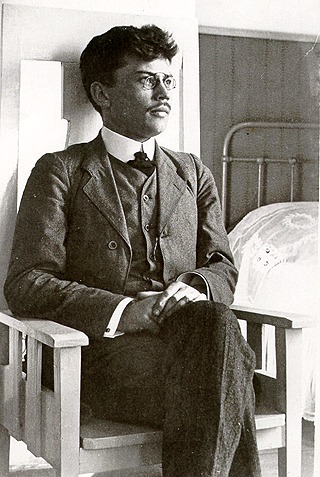Friedebert Tuglas on:
[Wikipedia]
[Google]
[Amazon]
 Friedebert Tuglas, born Friedebert Mihkelson or Michelson (2 March 1886 – 15 April 1971) was an
Friedebert Tuglas, born Friedebert Mihkelson or Michelson (2 March 1886 – 15 April 1971) was an Estonian literature
at Encyclopædia Britannica Persecuted by the authorities in the beginning of 20th century, he later became an acknowledged representative of Estonian literature in the
Database of Estonian Writers, retrieved 19 February 2015 His most famous short story is ''Popi ja Huhuu''. He was the member of the
Estonian Academy of Sciences Year Book, 12(39), 2006, ISSN 1406-1503, p. 164. Tuglas died in Tallinn in 1971, aged 85, not long after completing his memoirs, acknowledged as a major work in the writer's life. A museum commemorating his life was opened in Tallinn the same year. A short story prize commemorating Tuglas was established in 1971. A selection of Tuglas' stories is available in English entitled ''The Poet and the Idiot and Other Stories'' (Central European University Press, Budapest & New York, 2007, translated by Eric Dickens). A number of Tuglas' other stories were translated into English during Soviet times.
A selection of Tuglas' stories is available in English entitled ''The Poet and the Idiot and Other Stories'' (Central European University Press, Budapest & New York, 2007, translated by Eric Dickens). A number of Tuglas' other stories were translated into English during Soviet times.
Friedebert Tuglas Short Story Award
in Tallinn {{DEFAULTSORT:Tuglas, Friedebert 1886 births 1971 deaths People from Põlva Parish People from the Governorate of Livonia Estonian male short story writers Soviet literary historians Soviet male writers 20th-century male writers 20th-century short story writers Hugo Treffner Gymnasium alumni University of Tartu faculty Members of the Estonian Academy of Sciences People's Writers of the Estonian SSR Burials at Metsakalmistu Estonian literary critics Estonian editors Looming (magazine) editors
 Friedebert Tuglas, born Friedebert Mihkelson or Michelson (2 March 1886 – 15 April 1971) was an
Friedebert Tuglas, born Friedebert Mihkelson or Michelson (2 March 1886 – 15 April 1971) was an Estonia
Estonia, formally the Republic of Estonia, is a country by the Baltic Sea in Northern Europe. It is bordered to the north by the Gulf of Finland across from Finland, to the west by the sea across from Sweden, to the south by Latvia, a ...
n writer and critic who introduced Impressionism
Impressionism was a 19th-century art movement characterized by relatively small, thin, yet visible brush strokes, open Composition (visual arts), composition, emphasis on accurate depiction of light in its changing qualities (often accentuating ...
and Symbolism
Symbolism or symbolist may refer to:
Arts
* Symbolism (arts), a 19th-century movement rejecting Realism
** Symbolist movement in Romania, symbolist literature and visual arts in Romania during the late 19th and early 20th centuries
** Russian sym ...
to Estonian literature
Estonian literature ( et, eesti kirjandus) is literature written in the Estonian language (c. 1,100,000 speakers) The domination of Estonia after the Northern Crusades, from the 13th century to 1918 by Germany, Sweden, and Russia resulted in few ...
.at Encyclopædia Britannica Persecuted by the authorities in the beginning of 20th century, he later became an acknowledged representative of Estonian literature in the
Soviet era
The history of Soviet Russia and the Soviet Union (USSR) reflects a period of change for both Russia and the world. Though the terms "Soviet Russia" and "Soviet Union" often are synonymous in everyday speech (either acknowledging the dominance ...
.
Biography
Tuglas was born inAhja
Ahja is a small borough (') in Põlva Parish, Põlva County in southeastern Estonia. Named after the Ahja River, it is located 191 km southeast of Tallinn and about 16km north of Põlva.
Ahja manor
The earliest references to Ah ...
, the son of a carpenter, and studied at the Hugo Treffner Gymnasium
Hugo Treffner Gymnasium ( et, Hugo Treffneri Gümnaasium; abbreviated as HTG) is a secondary school in Tartu, Estonia with special emphasis on science education. Founded by Hugo Treffner, it was the only large secondary school in 19th-century Est ...
from 1904 to 1905. After imprisonment for revolutionary activities, he went into exile in 1906, living in Finland, Germany, Belgium, Switzerland and France, before returning to Estonia in time for the February revolution of 1917.Friedebert TuglasDatabase of Estonian Writers, retrieved 19 February 2015 His most famous short story is ''Popi ja Huhuu''. He was the member of the
Siuru
The Siuru literary movement, named after a fire-bird in Finnic mythology, was founded in 1917 in Estonia.Jean Albert Bédé, William Benbow Edgerton, ''Columbia Dictionary of Modern European Literature'', Columbia University Press, 1980, , p237Ru ...
literary group and leader of Estonian literary group Young Estonia
Young Estonia () was a neo-romantic literary group established around 1905 and led by the poet Gustav Suits and short story writer Friedebert Tuglas. Other members of the group included Villem Grünthal-Ridala and Johannes Aavik. Gustav Suits ...
(''Noor-Eesti'') in the beginning of 20th century. He was one of the founders of the Estonian Writers' Union
The Estonian Writers Union (Eesti Kirjanike Liit, abbreviated EKL), is a professional association of Estonian writers and literary critics.Marje Jõeste, Küllo Arjakas, ''The Baltic States'', Estonian Encyclopaedia Publishers, 1991, page 64
Hist ...
and served as its chairman in 1922, 1925–1927 and 1937–1939.
Tuglas was granted the title of People's Writer
People's Writer (, ''Narodný pisatelj'') was a title granted by the Republics of the Soviet Union and the Autonomous Soviet Socialist Republics to its distinguished writers.
It was a title similar to that of People's Artist of the USSR
People ...
of the Estonian SSR in 1946. The same year he was elected a corresponding member of the Soviet Estonian Academy of Sciences. He subsequently fell into disfavor, officially blacklisted, deprived of his civil rights and excluded from membership in all institutions, including the Writers’ Union, from which he was expelled in 1950."Remembrance".Estonian Academy of Sciences Year Book, 12(39), 2006, ISSN 1406-1503, p. 164. Tuglas died in Tallinn in 1971, aged 85, not long after completing his memoirs, acknowledged as a major work in the writer's life. A museum commemorating his life was opened in Tallinn the same year. A short story prize commemorating Tuglas was established in 1971.
 A selection of Tuglas' stories is available in English entitled ''The Poet and the Idiot and Other Stories'' (Central European University Press, Budapest & New York, 2007, translated by Eric Dickens). A number of Tuglas' other stories were translated into English during Soviet times.
A selection of Tuglas' stories is available in English entitled ''The Poet and the Idiot and Other Stories'' (Central European University Press, Budapest & New York, 2007, translated by Eric Dickens). A number of Tuglas' other stories were translated into English during Soviet times.
See also
*Friedebert Tuglas short story award
Friedebert Tuglas short story award ( et, Friedebert Tuglase novelliauhind) is an Estonian literary award. The award was established in 1970 by Friedebert Tuglas itself. First recipients was chosen out in 1971 by Tuglas itself.
Recipients
1971
*J ...
References
External links
Friedebert Tuglas Short Story Award
in Tallinn {{DEFAULTSORT:Tuglas, Friedebert 1886 births 1971 deaths People from Põlva Parish People from the Governorate of Livonia Estonian male short story writers Soviet literary historians Soviet male writers 20th-century male writers 20th-century short story writers Hugo Treffner Gymnasium alumni University of Tartu faculty Members of the Estonian Academy of Sciences People's Writers of the Estonian SSR Burials at Metsakalmistu Estonian literary critics Estonian editors Looming (magazine) editors